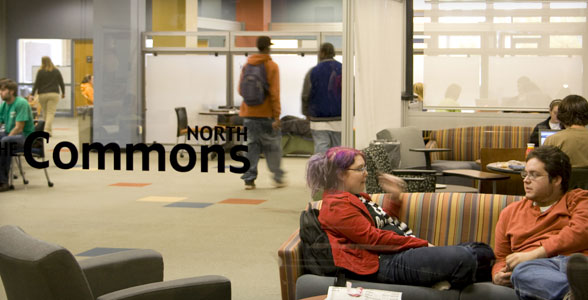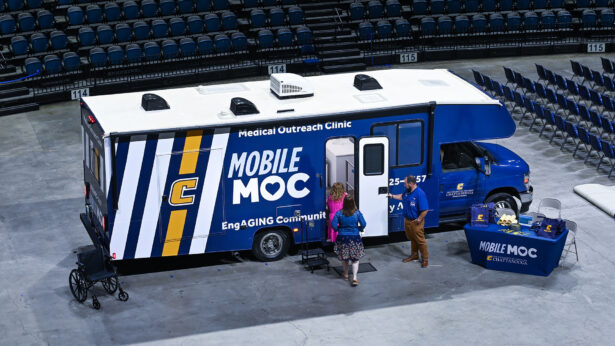By Diane Ballard
Long nights at the library. We all remember them. And no matter where we went to school, “the library” is fixed in our memory, preserved just as it was in our day.
This just in: libraries have moved on. Like our entire society, they’ve been transformed by technology. The physical facilities are different too (think comfy chairs, think snacks), and so are the staff (think information specialists, think answering student questions via instant messaging).
What’s the world coming to—or at least the library part of the world? It’s changing so fast that some librarians have adopted the slogan: If it works and you know how to use it, it’s obsolete.
It’s been alleged that, in the age of near-universal access to Google, the library reference desk is about as relevant as a fully stocked Rolodex. But librarians who talked to Tennessee Alumnus say they’re as busy as ever; their jobs have just morphed. And by and large, they’re enjoying the ride.
“In the last 10 years, the number of questions we get from students has gone way down,” says Rita Smith, associate dean of UT Knoxville libraries. “Now the questions are much broader and take more time.” True, students can find easy answers via Google. But Smith says the information explosion has actually upped the need for reference librarians’ expertise, since they’re trained to not only help discover hard-to-find facts but also to manage the information.
Jane Row in UT Knoxville libraries research services says librarians have access to databases that contain information not freely available on the web. “Teaching students how to use these resources is a critical part of the educational mission of the library.” Reference librarians, she says, understand how to access information efficiently and “how to ask the right questions so a student can focus a research question and come out with information that’s on target.”
Kay Cunningham (Knoxville ‘88), a librarian at the University of Memphis, says even though plentiful information is available online, librarians have to understand how it all works.
“Having online access to many databases doesn’t excuse the librarian from having to understand how all those databases work. Otherwise, who is the frustrated user going to ask for help?”
New Responsibilities
Technology may look seamless to the user, she says, but it’s the librarian’s responsibility to understand what’s happening behind the scenes.
Today’s students have grown up with technology, but just because they have the latest gear doesn’t necessary mean they know how to use it, Row says. “They may have an iPod, a fancy phone, and a great laptop but still not know where to go to find the information they need to satisfy an assignment.”
At the University of Memphis, Cunningham has the title of electronic resources librarian. She indeed helps students with questions related to assignments, but her job involves much more. Cunningham says she has had to take up the slack of positions lost to budget cuts, and she’s certainly not twiddling her thumbs due to the decreased volume of student questions at the reference desk.
“I tend our databases, keeping up with what’s new and promoting additions and changes. I edit web pages and maintain wiki pages. I download and archive usage statistics. I set up training schedules and conduct training for library staff and users.” She also teaches and logs time on the reference desk.
Even though students can submit questions by email or instant messaging, they still are more likely to walk up to the reference desk. At UT Knoxville libraries, about 80 percent of inquiries are face-to-face.
“We do a lot of consultation by appointment,” Smith says, noting that graduate students are particularly heavy users of library reference services.
At UT Chattanooga, Beverly Simmons (Knoxville ’05) sees similar student usage patterns: “About 20 percent of student questions are submitted electronically via phone, instant messaging, and email, and 80 percent of our questions come in person at the reference desk.
“I work every day with students to help them find information. The biggest change I’ve noticed has been the tremendous increase in the number of students who come to the library itself—numbers have doubled in the last seven years—and their willingness to ask us for help at the reference desk, through one-on-one research appointments, or via phone, IM, and email.”
A More Relaxed Atmosphere
Libraries in general are more welcoming places than in years past. At UTC, library instruction classes familiarize students with the facility and the staff. “Over 6,000 students attended a library instruction class last year out of a total student population of 9,800,” says Simmons, a UC Foundation assistant professor as well as reference librarian. The atmosphere is much more relaxed than in the past. At UT Knoxville’s Hodges Library, the Commons provides a “welcoming atmosphere for digital natives,” Smith says. (“We older people are digital immigrants,” she smiles.)
“The Commons is a very social place, not quiet, the furniture is movable, and it’s open 24 hours,” Smith says.
At UT Chattanooga, Simmons says students can take food and drinks “nearly anywhere” in the Lupton Library. “We’ve purchased overstuffed chairs, coffee tables and end tables, upholstered chairs with a swing-away desk for laptops and books, and cushioned rockers.”
Some of the demand for flexible seating arrangements is driven by a change in the style of learning, Smith says. “Students work in groups much more. They have to seek out more information now. Learning isn’t as passive as it used to be.”
Reference librarians play a big role in helping students seek knowledge. Many student questions, Cunningham says, are complicated, “involving more time and expertise on the part of the reference worker.”
“They come to us when they’re stumped. Most often these students are using resources inappropriate to their questions, relying on the tools they may have learned to use as freshmen.” Upper level and graduate students may be aware of multidisciplinary databases but may need specialized ones. Even if they are familiar with databases, they may not know how to use them to maximum advantage or can’t find exactly what they need. “They’re still wading in through the shallow end of the information pool when they need to be diving” – a plunge reference librarians are trained and willing to take, Cunningham says.
“All librarians in one way or another should be electronic resources librarians now. The electronic resource is as standard as the book or the print journal,” she says. “The most difficult aspect of technology for librarians to cope with is the rapidity of the change that comes with it.” But, she says, “Technology is simply one of the tools of my job, something I have to understand.”
A New Day for Marian the Librarian
Even as libraries have changed, so have the careers available to information science professionals. Certainly libraries still employ many of them, but others take jobs in database design, web design, digital publishing, and competitive intelligence.
Bonnie Carroll, a member of the UT Knoxville College of Communication and Information board of visitors, used her library science degree from Columbia to found Information International Associates, an Oak Ridge, Tennessee, information management and technology company that, among other things, manages libraries.
At heart, it’s all about the fundamentals, she says—understanding the structure of knowledge and knowing how to manage it. “Librarians have to know the best technology to manage information. Even a fully electronic library would need a librarian to organize it.”
Carroll employs several UT graduates, including Randy Hoffman, who manages libraries. Today’s reference desk is wherever people are, she says. “The reference desk is mobile. It’s on home computers or on PDAs. Librarians are working hard to get the information people need to them. The end user doesn’t necessarily interface with the librarian, but a librarian has made the information they need available.”
Carol Tenopir, professor of information sciences at UT Knoxville, says technology is introduced early in course content in the School of Information Sciences. “Digital resource creation, use, and management are a part of many classes,” she says. “Some courses focus on technology, including digital libraries, information access and retrieval, database management, and network applications.” And all students take at least some of their classes online to experience digital delivery first hand.
The job of librarian isn’t what it used to be, and where it’s bound is anyone’s guess. The profession includes specialties that would have been unimaginable a couple of decades ago, says Carroll. “Every one of us is part of that reference desk of the future.”



